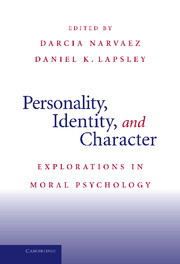Book contents
- Frontmatter
- Contents
- Contributors
- Introduction
- 1 The Moral Personality
- 2 The Moral Functioning of the Person as a Whole: On Moral Psychology and Personality Science
- 3 Moral Science? Still Metaphysical After All These Years
- 4 Cultural Pluralism and Moral Identity
- 5 Neuroscience and Morality: Moral Judgments, Sentiments, and Values
- 6 Triune Ethics Theory and Moral Personality
- 7 Early Foundations: Conscience and the Development of Moral Character
- 8 The Development of the Moral Personality
- 9 Urban Neighborhoods as Contexts for Moral Identity Development
- 10 Moral Personality Exemplified
- 11 Greatest of the Virtues? Gratitude and the Grateful Personality
- 12 The Elusive Altruist: The Psychological Study of the Altruistic Personality
- 13 Growing Toward Care: A Narrative Approach to Prosocial Moral Identity and Generativity of Personality in Emerging Adulthood
- 14 Moral Identity, Integrity, and Personal Responsibility
- 15 The Dynamic Moral Self: A Social Psychological Perspective
- 16 The Double-Edged Sword of a Moral State of Mind
- 17 Moral Identity in Business Situations: A Social-Cognitive Framework for Understanding Moral Functioning
- 18 The Moral Functioning of Mature Adults and the Possibility of Fair Moral Reasoning
- 19 Moral Personality: Themes, Questions, Futures
- Author Index
- Subject Index
2 - The Moral Functioning of the Person as a Whole: On Moral Psychology and Personality Science
Published online by Cambridge University Press: 05 June 2012
- Frontmatter
- Contents
- Contributors
- Introduction
- 1 The Moral Personality
- 2 The Moral Functioning of the Person as a Whole: On Moral Psychology and Personality Science
- 3 Moral Science? Still Metaphysical After All These Years
- 4 Cultural Pluralism and Moral Identity
- 5 Neuroscience and Morality: Moral Judgments, Sentiments, and Values
- 6 Triune Ethics Theory and Moral Personality
- 7 Early Foundations: Conscience and the Development of Moral Character
- 8 The Development of the Moral Personality
- 9 Urban Neighborhoods as Contexts for Moral Identity Development
- 10 Moral Personality Exemplified
- 11 Greatest of the Virtues? Gratitude and the Grateful Personality
- 12 The Elusive Altruist: The Psychological Study of the Altruistic Personality
- 13 Growing Toward Care: A Narrative Approach to Prosocial Moral Identity and Generativity of Personality in Emerging Adulthood
- 14 Moral Identity, Integrity, and Personal Responsibility
- 15 The Dynamic Moral Self: A Social Psychological Perspective
- 16 The Double-Edged Sword of a Moral State of Mind
- 17 Moral Identity in Business Situations: A Social-Cognitive Framework for Understanding Moral Functioning
- 18 The Moral Functioning of Mature Adults and the Possibility of Fair Moral Reasoning
- 19 Moral Personality: Themes, Questions, Futures
- Author Index
- Subject Index
Summary
Noun phrases such as “moral psychology” and the “moral domain” appear to refer to singularities. There apparently is a particular type of psychology that comes into play in a particular domain of life: the moral. And maybe there is. Yet even a quick glance at work in the field reveals multiplicities.
Consider the model presented by Rest (1984; also reviewed in Bergman, 2004). The components of moral functioning that are identified encompass psychological functions that are diverse: interpreting situations, formulating courses of action, contemplating and selecting among alternative values that bear on a given circumstance, executing courses of action. If one considers also the psychological structures and processes (declarative and procedural knowledge, affective systems, cognitive appraisal processes, etc.) that may come into play as individuals execute each of these four functions (interpreting, formulating, selecting, executing), the resulting set of psychological systems is so diverse that it becomes difficult to identify systems that are not involved in moral reasoning or action. The set of relevant psychological systems only expands when one considers theoretical views in which evolved, domain-specific mechanisms that may be localizable within specific regions of the brain underpin responses to moral dilemmas and violations of moral codes (Greene, Sommerville, Nystrom, Darley, & Cohen, 2001; Haidt, 2001; Hauser, 2006). When psychologists whose primary expertise is not in moral psychology – such as the present authors – look in on the field, they are tempted to ask: “What's the difference between moral psychology and psychology in general?”
- Type
- Chapter
- Information
- Personality, Identity, and CharacterExplorations in Moral Psychology, pp. 30 - 51Publisher: Cambridge University PressPrint publication year: 2009
- 14
- Cited by

